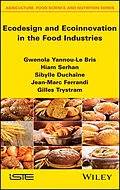Innovations of agri-food systems during the last 50 years have been guided by a globalized agro-industrial paradigm, which has contributed to climate change, degradation of natural resources, soil depletion, social inequalities, loss of biodiversity and various food-related health problems.
Despite the increasing emphasis of food policies and research to address these issues with ecologically sustainable innovations, there are still no studies that explain how to utilize and integrate ecodesign practices in food products development in a world of finite resources.
This book explains how to employ ecodesign in business models to address the economic, social, environmental, and nutritional problems that face the world s food systems. The lessons of the EcoTrophelia project ? a unique program implemented by a group of European agricultural higher education institutions to involve students in designing and developing food ecoinnovation projects ? are explored. Through an analysis of these projects, the authors describe the tools, methods and standards that were developed to institute ecodesign into the business models of 11 ecologically-friendly food products.
This book provides operational good practices that can be implemented in educational programs and agri-food industries, to orient learning and practices towards greater sustainability.
Autorentext
Gwenola Yannou-Le Bris is Senior Lecturer in Ecodesign and Ecoinnovation Management at AgroParisTech, France. Hiam Serhan is a Postdoctoral Researcher in Ecoinnovation Management at AgroParisTech, France. Sibylle Duchaine is Senior Lecturer in Management and Human Resources at ONIRIS, Veterinary Medicine, Food Science and Engineering, National College, France. Jean-Marc Ferrandi is Professor of Marketing, Consumer Behavior and Innovation at ONIRIS, Veterinary Medicine, Food Science and Engineering, National College, France. Gilles Trystram is Professor of Industrial Engineering and Director General of AgroParisTech, France.
Inhalt
Foreword ix
Acknowledgments xi
Introduction xv
Part 1. Food and Sustainable Development Challenges 1
Chapter 1. Food: Issues and Challenges 3
1.1. History and roles of food 3
1.2. Environmental impacts related to food 7
1.3. Food systems 8
1.3.1. The emergence of food systems 9
1.3.2. Characterization of food systems 11
1.3.3. Historical evolution of food systems: models and functions 12
1.4. Evolution of food: disruptions in the practices and symbolism of foodstuffs 19
1.4.1. Disruptions in agricultural production modes 20
1.4.2. Disruptions in the way companies are organized 22
1.4.3. Disruptions in the ways in which space is occupied and developed 24
1.4.4. Disruptions in distribution systems 25
1.4.5. Disruptions in consumption patterns 27
1.4.6. Disruption in food values 28
1.5. Contribution of food systems to food supply 31
1.5.1. An intensive, specialized and concentrated agro-industrial system 31
1.5.2. A globalized agro-industrial food system 32
1.6. Trends, challenges and scenarios for a sustainable global food system 34
1.6.1. Three trends and challenges 34
1.6.2. Three scenarios or tools to explore the possible future of the global food system 35
1.7 Conclusion 38
Chapter 2. The Ecological Transition for Sustainable Food 41
2.1. Food and ecological transition 41
2.2. Ecological transition and corporate social responsibility 45
2.2.1. The different strategies observed 47
2.2.2. The origin of stakeholders and corporate social responsibility 47
2.3. Taking environmental issues into account 57
2.3.1. Taking environmental performance into account in product design 60
2.3.2. Qualitative or semi-qualitative environmental assessment tools and methods 62
2.3.3. Quantitative and monocriteria environmental assessment tools and methods 65
2.3.4. Quantitative and multi-criteria environmental assessment tools and methods: lifecycle assessment (LCA) 66
2.4. Taking nutritional issues into account 70
2.4.1. The framework for action 70
2.4.2. Tools and indicators for nutritional profiling of foodstuffs 72
2.5. Consideration of economic and social issues 74
2.5.1. Principle 74
2.5.2. Illustration of a Canadian dairy industry 75
2.6. Implementation of an ecodesign approach 76
2.7. Ecodesign practices for food chains 79
2.7.1. The principles of transforming business practices through standards 80
2.7.2. Management system standards: tools for managing sustainable development 82
2.7.3. The role of standards in fostering innovations related to sustainable development 89
2.7.4. Consumer behavior 91
2.7.5. Agricultural practices 93
2.7.6. More sustainable agri-food business practices 94
2.8. Conclusion 98
Part 2. Implementation of Ecodesign Practices in Food Innovation Projects 101
Chapter 3. Ecodesign of Food: The Cases of ÉcoTrophélia Projects 103
3.1. The ecological transition, a driver of innovation 103
3.2. Ecoinnovating by taking into account ecodesign practices 104
3.3. Know-how resulting from the ÉcoTrophélia competition 107
3.4. Framework for the analysis of ÉcoTrophélia projects 108
3.5. ÉcoTrophélia projects 113
3.5.1. VitaPlus: a range of dishes for pleasure, health and vitality for the elderly 115
3.5.2. Mixi'Mousse: rice-based mixes and mousses for hospitalized people suffering from dysphagia 122
3.5.3. Minigloo: a nutritious frozen dessert for children aged 1 to 3 129
3.5.4. Vertu: biscuits with plant extracts and essential oils to support quitting smoking 137
3.5.5. Lardons de la mer: high-quality fish offcuts used as bacon meat 145
3.5.6. PannIno: ecodesigned gnocchi with bakery by-products in three flavors 154
3....
